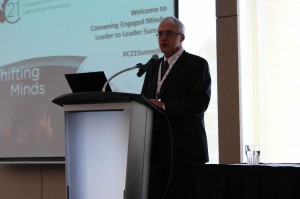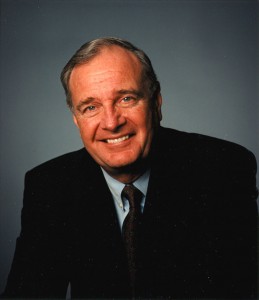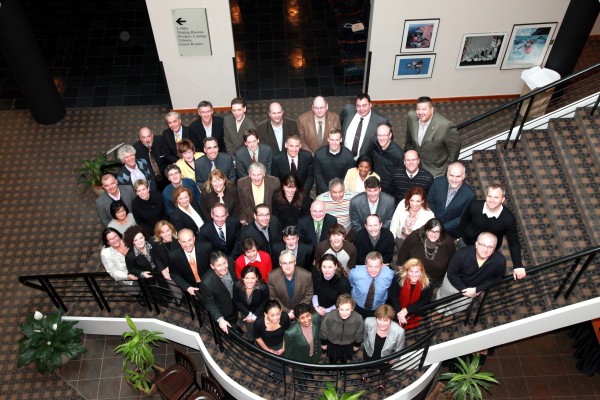Robert Martellacci, Vice President of C21 Canada, interviews Bill Kierstead, Principal at James M. Hill Memorial High School, Miramichi NB, and recipient of the Shifting Minds Individual Award for 21st Century Learning and Innovation.
C21 Canada Interview with Doug Prescott, Head of School at the Canadian International School in Beijing
Robert Martellacci, Vice President of C21 Canada, interviews Doug Prescott, Head of School at the Canadian International School in Beijing and recipient of the Shifting Minds School Award for 21st Century Learning and Innovation.
C21 Canada’s Summit 13: Context and Outcomes
 By John Kershaw, President of C21 Canada, President of 21st Century Learning Associates, and the former Deputy Minister of Education for New Brunswick
By John Kershaw, President of C21 Canada, President of 21st Century Learning Associates, and the former Deputy Minister of Education for New Brunswick
C21 Canada’s Summit 2013 Convening Engaged Minds: Leader to Leader proves to be a resounding success!
Summit 2013, held February 12th and 13th in King City at the Kingbridge Institute and Convention Centre, convened over 100 leaders from various sectors of Canadian society to discuss the need for and how to modernize Canada’s public education systems.
C21 Canada was created two years ago with a vision of engaging Canadians in the need to modernize our public education systems across Canada. By modernize we mean to shift our education systems to ensure our students learn the competencies they will need for success in this new knowledge, digital and global world of ours.
Most people will agree that the world has changed dramatically over the past couple of decades. Globalization and the technology revolution have created a new environment offering Canadians both new opportunities and new challenges.
Structural changes to the economy and significant societal changes are occurring largely as a result of enhanced access to information through technology and it is predicted that technological advancements will continue to accelerate the pace of change.
This new digital landscape offers huge opportunities to connect with others and create new products and services. Value added knowledge creation has become the economic and social driver of our age. At the same time, significant and complex challenges also lie ahead, ranging from the world’s unsettled fiscal climate to the global climate itself.
We need to ensure that our children have access to modern learning environments and teaching practices if they are going to benefit from and be equipped for the uncertainties of this knowledge and digital age.
C21 Canada believes our education systems need to be modernized to reflect this new reality. And this means that what we teach and how we teach needs to change as well.
What has to change?
A vision of 21st century learning called Shifting Minds offers a framework to guide discussions on a way forward. Shifting Minds describes how the three foundations of learning, literacy, numeracy and science, must remain at the core of education and how students will a need to master the following key competencies to ensure their success in an unpredictable global world.
- Creative, innovative and entrepreneurial thinking
- Critical thinking
- Collaboration – often with people in other countries
- Communication – using the modern technologies of our time
- Culture and Ethical Citizenship
- Computer and Digital technologies
- Character
What was the Summit in King City all about?
Last year C21 Canada convened a Summit with 50 of Canada’s most innovative education leaders to help us design our Shifting Minds vision and framework. This year the invitation was extended to private sector business leaders and representatives from national leadership organizations to join educators in addressing the need for change. The primary goal of the Summit was to share common goals for learning and innovation and work together to identify the best ways to engage Canadians in the discussion
Who was at the Summit?
The delegates reflected an inclusive mix of public and post secondary educators, including teachers, professors, principals, deans, superintendents and federal and provincial ministry people, along with business, financial, and economic leaders from the private sector. Organizations such as the Canadian Chamber of Commerce, national banks, publishers, knowledge-based companies, young Canadian research leaders from a group called Action Canada, and organizations representing the youth voice, such as TakingItGlobal, were present. A representative from the National Association for Workforce Improvement (NAWI) in the United States was also present to observe the discussions.
The Right Honourable Paul Martin, former Prime Minister, joined delegates on the evening of our first day and underlined the need for change as well as the imperative of ensuring Canada’s aboriginal students receive equitable learning opportunities and fiscal resources along with culturally relevant learning resources.
Bruce Dixon, an international advisor for 21st Century learning and innovation reinforced the relevance of the Shifting Minds direction. Warren Jestin, Vice President and Chief Economist with Scotiabank, shared his insights on economic trends, highlighting the implications for young people and the competencies they will need in the future employment context. The group from Action Canada shared their findings and recommendations from a survey of teachers and analysis of policy documents in five Canadian provinces.
A business leader’s panel, education leader’s panel and a young research leader’s panel allowed a cross-section of perspectives from across Canada and from various sectors to be shared on what needed to change in education. At the same time, the delegates interacted, infusing their perspectives and questions with interested parties via social media outlets.
What were the major outcomes?
From our keynote speakers and panel members we learned that there is a growing and shared interest in modernizing public education to meet the needs of our students and to position Canada for future economic and social success. The need to communicate effectively with Canadians using a variety of means and diversity of media outlets was highlighted. The need for clarity and simplicity in the messaging was underlined, as well as the need to provide evidence and celebrate existing examples of best practices.
Although by no means an exhaustive list of the discussions held at the Summit, examples of other outcomes of the meeting may be grouped under five themes:
- All agreed that meeting the learning needs of students should be the focal point of any effort to modernize the system.
- There is clearly a growing alignment of interest between various sectors of Canadian society in modernizing our public education systems. There is also a growing recognition that our children need different life skills today, and that employers are more and more looking for people with the competencies mentioned above.
- There is a growing sense of urgency given that other countries are already modernizing their systems, and in today’s global environment, our youth will be competing for spaces at universities and for jobs with young people from other countries.
- The need to design an effective means of communication to engage Canadians in this important discussion was highlighted. Delegates underlined the need to ensure the voices of students, parents and teachers were heard, to engage First Nation leaders, and to support Canada’s political leaders make the right policy and investment decisions.
- Delegates recognized that examples of modern and innovative learning and teaching practices already existed in Canada. They underlined the need to build on these successes and create education systems where all teachers could adopt modern instructional practices.
What are C21 Canada’s Next Steps?
C21 Canada’s next step is to reflect on what we have learned, not only from the Summit but from all the other forms of social media and interaction. Perhaps the biggest challenge is to effectively communicate the need for change and what needs to change to Canadians, and find the right communication processes to effectively engage them in the conversation.
Canadians know we have one of the world’s best education systems and that our teachers are among the best in the world. What many Canadians may not know is that even countries with the best education systems are already investing in the kinds of changes we are talking about to better position their students for success in the future.
We need to ensure that we Canadians are not complacent based on our past success in education, but look forward and position our young people, and our country, for future success. All Canadians have a stake in getting this right.
We invite all Canadians to engage and join the conversation.
The Right Honourable Paul Martin to Speak at the 2nd Annual C21 Canada Summit
 TORONTO, Feb. 6, 2013 /CNW/ – C21 Canada – Canadians for 21st Century Learning & Innovation, a not-for-profit organization comprised of education organizations and knowledge sector companies, will host its second annual Summit on 21st century learning, Tuesday, February 12 to Wednesday, February 13 at the Kingbridge Centre in King City.
TORONTO, Feb. 6, 2013 /CNW/ – C21 Canada – Canadians for 21st Century Learning & Innovation, a not-for-profit organization comprised of education organizations and knowledge sector companies, will host its second annual Summit on 21st century learning, Tuesday, February 12 to Wednesday, February 13 at the Kingbridge Centre in King City.
The Summit, entitled Convening Engaged Minds: Leader to Leader, will feature a Fireside Chat with former Prime Minister Paul Martin on the evening of February 12th. The event will bring together 100 of Canada’s education and business leaders to gather perspectives on Canada’s skill requirements in the knowledge and digital age and on what the related education policy and investment priorities should be for the country.
“Today’s innovation-driven economy and society demands people with 21st century inspired competencies and skills. A key challenge for Canada is to modernize our learning systems and ensure that all Canadians, without exception, are positioned for success on an equitable basis,” states Mr. Martin.
The product of C21 Canada’s inaugural Summit last year was the organization’s Shifting Minds document, a national vision and framework for 21st century models of learning in Canada. The goal of C21 Canada is to support the accelerated and effective integration of 21st century skills and competencies, teaching practices and learning technologies into Canada’s education systems.
“The ‘Arab Spring’ is coming to more than the Middle East. It is coming to education, healthcare, government and every place where the radical democratization of knowledge and power and the culture that comes along with it reaches the public. And that is about everywhere. It is not only necessary to adapt curricula for 21st century needs. It’s necessary to adapt learning technologies and methodologies as well,” states John Abele, co-founder and director of Boston Scientific. Mr. Abele, a well respected and successful innovator, will share the Fireside Chat with Mr. Martin.
C21 Canada is also launching its inaugural National 21st Century Leadership and Innovation Awards. Five people from across Canada will be recognized and honoured for their excellence in 21st Century Leadership and Innovation.
Go to www.c21canada.org for a complete Summit agenda.
About C21 Canada
C21 Canada is a unique blend of national education associations and knowledge sector businesses united in their belief that 21st century models of learning must be adopted in public education on an urgent basis to position Canadians for economic, social and personal success in the high skills, knowledge and innovation based economy.www.c21canada.org
C21 Canada’s Founding Members: Canadian Education Association, Canadian School Board Association, Dell, EF Educational Tours, IBM, McGraw-Hill Ryerson, Microsoft, Nelson Education, Oxford University Press, Pearson, Scholastic Education, SMART Technologies.
Secretariat: 21st Century Learning Associates, MindShare Learning
Summit Twitter hashtag: #C21Summit13
For media inquiries, please contact:
Robert Martellacci
C21 Canada, Vice-president
robert.martellacci@c21canada.org
416.569.2106
Shifting Minds: 21st Century Learning Summit

C21 Canada successfully hosted their inaugural forum on 21st Century learning February 15th at the Kingbridge Centre in King City, Ontario. The event allowed the founding members of Canadians for 21st Century Learning and Innovation Summit (C21 Canada) to benefit from the advice of 50 education and business leaders from across Canada. The delegates discussed and provided feedback on C21 Canada’s draft position paper on 21st Century, entitled Shifting Minds and also identified the key actions C21 Canada should pursue to further the 21st Century learning agenda in Canada.
The Summit commenced with an introductory presentation on global economic, social and learning trends in by Charles Fadel, author of 21st Century Skills and founder of the Centre for Curriculum Re-Design located at Harvard University. The delegates also discussed the Canadian Education Association’s recent findings relating to how Canadian students were disengaging from learning and how new evidence on how people learn combined with modern instructional practices will improve student engagement and performance.
C21 Canada also took the opportunity to officially launch their organization and unveil their new website www.c21canada.org.
C21 Canada’s Shifting Minds draft document identifies the key elements of a 21st Century learning framework, including the need for today’s students to be highly skilled in literacy and numeracy, as well as learning competencies such as creative and innovative thinking, collaboration, communication and other skills that world leaders in learning have determined to be of increasing importance in the knowledge economy and era. Modern instructional practices designed to better engage students and help them improve their levels of understanding and achievement are also identified in the draft position paper while building on the relevancy of local content and themes from core ccurriula. Delegates supported C21 Canada’s position that while the global movement toward 21st Century models of learning in public education is a positive development for students, it was important to have a framework and model that reflects Canadian values and culture.
C21 Canada welcomes feedback on the Shifting Minds draft document, posted on this website. The document will then be revised based on the advice received and eventually form the base for C21 Canada’s efforts to see an accelerated pace of 21st Century competencies, instructional practices and digital resources being integrated into Canada’s learning systems. Anyone interested in commenting to C21 Canada on the draft Shifting Minds document is encouraged to send their remarks to feedback @ c21canada.org or below in the comment section.
The feedback from the delegates on the event was very positive and the members of C21 Canada were very pleased with the level of engagement and quality of advice received.
To that end….would selected participants be invited to submit a short blog or statements about their feedback to provide a hint of flavour as to the culture present…and to capture an authentic positive voice…..some of the comments made by participants during the lightening round provided optimisn and a positive voice to the process.
– John Kershaw, President, C21 Canada
